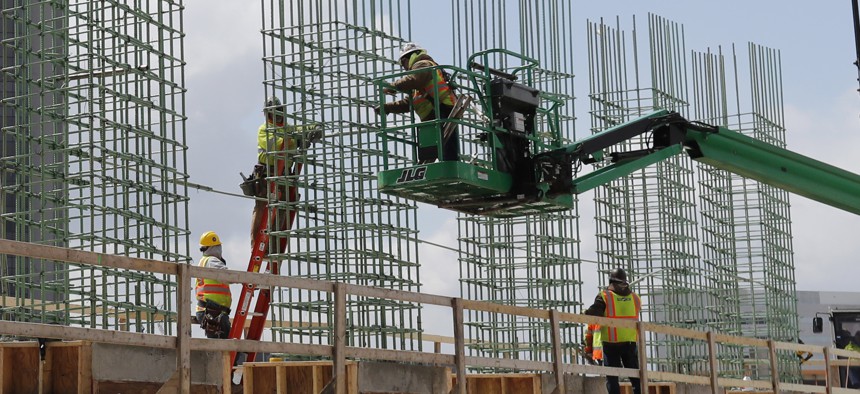House Democrats Lay Out $1.5 Trillion Infrastructure Plan

Work continues on a bridge on the Interstate Highway 75 project, Thursday, April 16, 2020, in Troy, Mich. AP Photo/Carlos Osorio
Democrats say the proposal would help create jobs necessary to help the economy recover after the coronavirus pandemic. While the Trump administration this week also floated more infrastructure spending, it would likely face stiff opposition in the Senate.
House Democrats on Thursday rolled out a $1.5 trillion infrastructure package—heavy on green and renewable proposals—that they said will help the U.S. economy rebound after the coronavirus outbreak.
The House plans to combine several bills, including a $500 billion transportation proposal already working its way through committee, into a larger package called the “Moving Forward Act.” The broader package would spur construction of typical infrastructure priorities, such as roads and bridges, but also go beyond transit projects and include investments in affordable housing, broadband, schools and green energy initiatives.
Peter DeFazio, chairman of the Transportation and Infrastructure Committee, warned that it will be essential for Congress to foster new job creation to help the economy recover from the pandemic.
“We are going to need a lot of jobs, a lot of jobs aren’t coming back,” DeFazio said. “And we’re going to be in something that looks a lot more like the Great Depression than the Great Recession.”
More than 45 million Americans have filed for unemployment at some point during the pandemic and 20 million Americans are still receiving benefits.
The Trump administration has signaled it is also considering a $1 trillion infrastructure package, though it’s not clear how closely its priorities will align with House Democrats.
But an infrastructure proposal from either the House Democrats or Trump administration is unlikely to gain much traction in the Republican-led Senate. While there has been some forward momentum for a transportation infrastructure bill, Republicans in the Senate have expressed skepticism about moving forward with large spending packages, especially after backing nearly $3 trillion in coronavirus relief earlier this year.
One House Republican expressed skepticism over how the House proposal would be paid for and its green spending priorities.
“To pay for it with the gas tax, we’d have to double it at a time when so many Americans are struggling to make ends meet because of the pandemic,” said Rep. Sam Graves, the Ranking Member on the transportation committee. “Ultimately, this bill is a costly, seismic shift in our transportation programs, at an incredibly uncertain time when no one knows whether Covid-19 will alter the way people get around.”
House Ways and Means Chairman Richard Neal said the bill could be paid for using a combination of government subsidized bonds, private equity bonds, and some borrowing. But he said he was open to negotiation.
A $500 million transportation bill Democrats introduced earlier this month is part of the broader infrastructure package. In addition to the transit spending, the proposal also includes $100 billion for low income schools, $100 billion to create or preserve for affordable housing, $100 billion to expand broadband connections, $25 billion for drinking water, $45 billion for wastewater infrastructure, $70 billion for clean energy projects, and $30 billion to upgrade hospitals.
It would also create or expand tax credit programs that would be used to promote private or state and local government investments, promote revitalization in economically distressed communities, and encourage rehabilitation of historic buildings or homes.
House Speaker Nancy Pelosi said the proposals “make real the promise of building infrastructure in a green and resilient way.” She intends to hold a vote on the package before the July 4 recess.
“It's job-creating in its essence, but it's also commerce-promoting,” Pelosi said. “So, it grows the economy of our country.”
Andrea Noble is a staff correspondent with Route Fifty.
NEXT STORY: NIH opens COVID-19 big data hub to researchers





